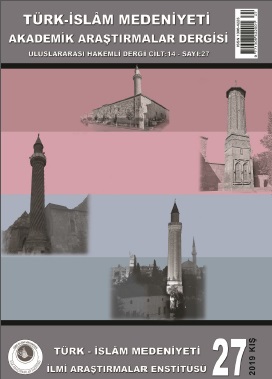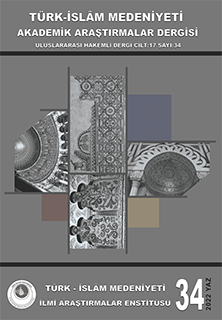Some Evaluatıons on the Applıcatıon of the Travel Memorandum ın the Perıod of Mahmud II
Keywords:
The memorandum of travel (passage), Sultan Mahmud II., Ottoman Empire, security of Istanbul, Greek revolt of 1821Abstract
The period of Mahmud II is known as the period in which some radical changes and practices, especially in the field of law, are experienced. One of them is the application of the travel memorandum (application of permission). The aim of this practice was mainly to prevent the Roum-Greek rebellion due to its relation with the Fener Greek Patriarchate and some Greek settlements, as well as to control the entrances and exits of Istanbul in order to protect Istanbul's security and socio-economic fabric. Sultan Mahmud II gave great importance to this practice. Several edicts regarding the reasons, applications, and some problems raised then were sent to those responsible, but they did not show the desired effect. In this study, some edicts submitted between November 1821 and February 1824 were analysed.
References
Başbakanlık Osmanlı Arşivi, Cevdet Tasnifi, Dâhiliye no: 3593
Numaralı Isparta Şeriye Sicili. Milli Kütüphane İbn-i Sina Salonu, tasnif no: 20 H-6
AHMED CEVDET PAŞA, 1301, Târih-i Cevdet, İstanbul, C. XII
ÇADIRCI, M., 1991, Tanzimat Döneminde Osmanlı Kentlerinin Sosyal ve Ekonomik Yapıları, Ankara
KARAL, E. Z., 1988, Osmanlı Tarihi, Ankara C.V,
KÖSTÜKLÜ, N., 1993, 1820-1836 Yıllarında Hamid Sancağı ve Türkiye (182 Numaralı Isparta Şeriye Siciline Göre), Selçuk Üniversitesi Eğitim Fakültesi yayınları, Konya
ÖZKAYA, Y., 1986, “1821 Yunan (Eflak-Buğdan) İsyanları ve Avrupalıların İsyan Karşısındaki Tutumları”, Üçüncü Askerî Tarih Semineri Bildiriler, Türk Yunan İlişkileri, Ankara
TURNA, N., 2013., Seyahat, Göç ve Asayiş Belgeleri: Mürur Tezkereleri, Kaknüs yay., İstanbul.
Downloads
Published
How to Cite
Issue
Section
License

This work is licensed under a Creative Commons Attribution-NonCommercial 4.0 International License.







